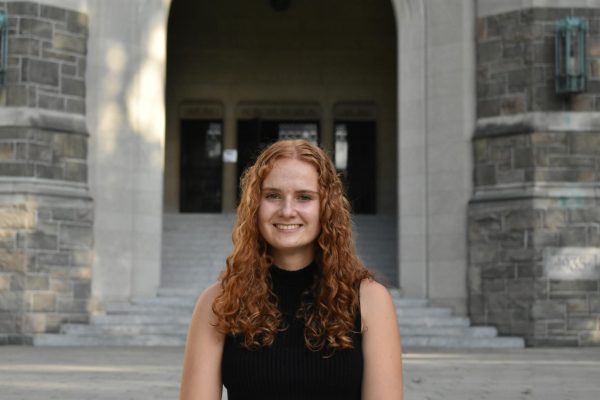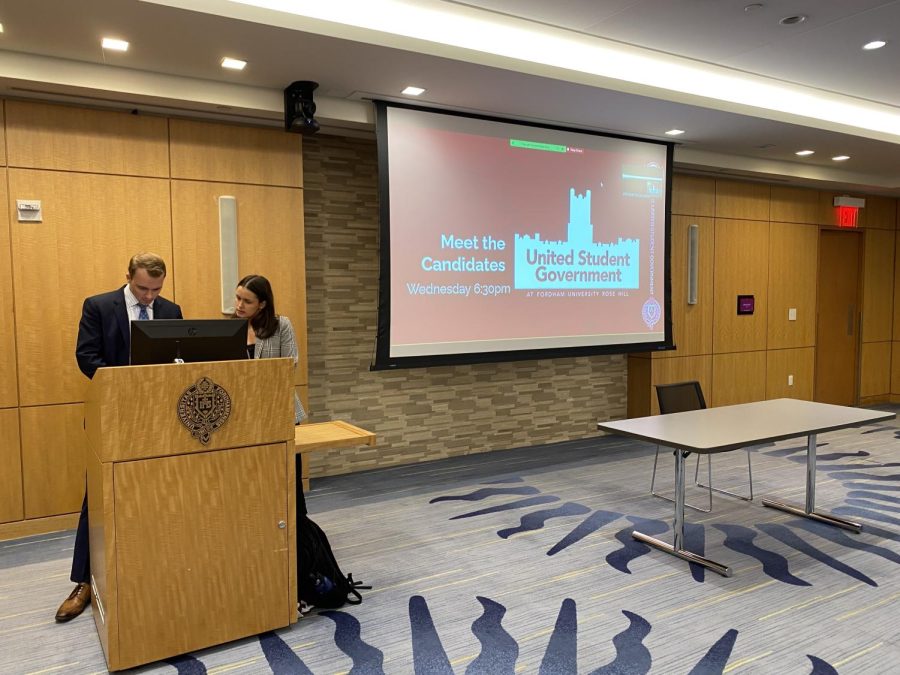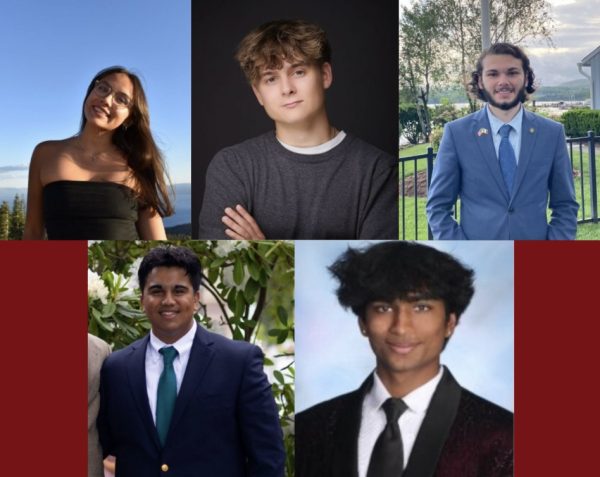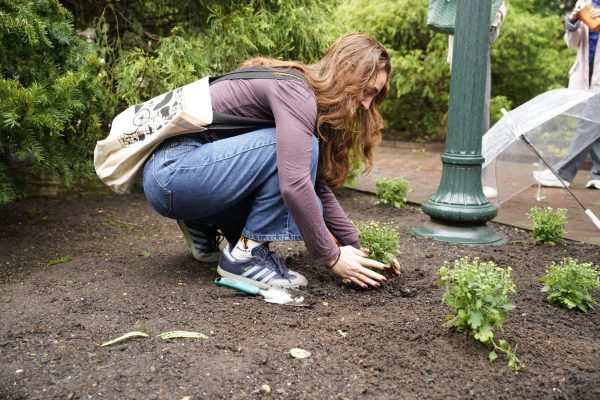“Meet the Candidates:” USG Elections for 2022-23 School Year
Courtesy of Isabel Danzis/ The Fordham Ram
USG held their yearly “Meet the Candidates” event where students running for student government could present their platforms and answer questions.
Candidates running for the various United Student Government (USG) positions presented their platforms to students during a “Meet the Candidates” event that occurred over April 6 and 7. Audrey Felton, FCRH ’22, current vice president of the operations committee and election commission chair, along with Thomas Reuter, FCRH ’22, current executive president of USG, led both nights of candidate presentations.
On April 7, executive board candidates were allotted five minutes to present their positions, and answer questions from The Fordham Ram’s editor in chief Ava Erickson, FCRH ’23, who was moderating the debate. Following Erickson’s questions, the audience was permitted to ask their own questions.
Maya Bentovim, GSB ’23, and Jonathan Eng, FCRH ’23, candidates for executive president and vice president, respectively, opened the debate with their platform. As a ticket, they hope develop more profound relationships USG vice presidents, create diversity, equity and inclusion training for USG through the Diveristy Action Coalition (DAC), communicate with students about their concerns, foster relationships with incoming students before they even come to Fordham and increase Fordham’s engagement with the Bronx community. The pair fielded questions about their idea to create town halls to inform students about USG, but clarified they would be “less intimidating” than the pre-existing Student Life Council (SLC) meetings. They additionally received questions about controversy and smear campaigns that occured about a USG senator last election cycle. Eng stated that he felt that the situation “had been handled appropriately” within USG and privately between the involved parties. The pair additionally clarified that all involved parties were able to work together effectively this year on USG, and that unity would be continued if they were elected.
Santiago Vidal, FCRH ’24, and Ava Coogan FCRH ’25, presented their campaign as the second duo running for executive president and executive vice president. Vidal emphasized that their election would mean the university’s first international student as president. He emphasized his past accomplishments in USG, specifically citing a proposal for financial equity for international students that USG passed last week. Coogan fielded questions about her lack of USG experience. She responded by saying that while she doesn’t have experience in Fordham USG, she does have previous leadership experience in other places and understands the role of executive vice president. Additionally, Coogan added that her perspective allows her to see the flaws of USG from the outside. They also responded to questions regarding students who feel left behind or like no tangible changes have been made by USG. The pair responded stating that specific issues can be resolved by increasing transparency and communication. They noted that students should not have to come USG but that USG should come to students.
There were several candidates running for positions unopposed. Cole Mullins, FCRH ’24, is running for vice president of student experience. For vice president of club operations Jillian Choy, GSB ’24, is the candidate. Alex Chavez, GSB ’23, is running for reelection for vice president of finance and budget. Liz Shim, FCRH ’23, is running for vice president of the sustainability committee. Briana Al-Omoush, FCRH ’24, is the candidate for vice president of diversity and inclusion.
For vice president of Fordham College Rose Hill (FCRH) dean’s council, Lucy Conlin, FCRH ’25, is running based on increasing research opportunities and increasing transparency university-wide. Jaimie Serruto, FCRH ’24, expressed his ideas for improving career services. Gaby Simporios, FCRH ’24, shared plans to develop career symposiums, cultural competency training with DAC as well as a STEM appreciation day.
For vice president of Gabelli School of Business (GSB) dean’s council, Katherine Doss, GSB ’23, expressed her platform of furthering diversity and inclusion in Gabelli, as well as working with faculty to make the business school welcoming to all. Maggie Kauderer, GSB ’23, ran on diversifying the Gabelli experience, creating a small business fair and developing more real estate classes. Natalia Kimmelshue, GSB ’23, ran on creating an accounting pilot class, revising ground floor and rethinking the info systems curriculum.
For vice president of health and security, Nafisa Raisa, FCRH ’24, shared her experience with harassment in the neighborhood surrounding Fordham and expressed plans to ensure there is more security at Fordham, while striking the balance between safety and over-policing. Farah Elrakhawi, FCRH ’24, who is running for re-election, spoke about her pride of the committee over the past year as well as her plans to streamline resources for students.
For vice president of communications, Frank Velez, FCRH ’23, ran on the premise of prioritizing service to others. Carley Walker, GSB ’25, promised a concrete subcommittees and to create USG public concerns hotline.
On April 6, candidates running for various USG class senate positions presented their platforms. Each senate candidate presented their platform in two minutes and like the executive debates, answered questions from moderators from The Fordham Ram, Erickson and Hanif Amanullah, FCRH ’24, managing editor. The floor was then opened to audience questions.
Senators from the class of 2023 campaigning for FCRH senator positions started the night. Andrew Falduto, FCRH ’23, a returning senator, opened the debate by expressing his general platform of expanding class offerings and improving campus health services. Keegan Roeder, FCRH ’23, followed Falduto and explained his position on expanding Bronx engagement programs for first years, improving food options on campus and creating comprehensive USG explanations of senate proposals to inform students. Maya Dominguez’s, FCRH ’23, platform was presented by Reuter, but as a senator, she plans to increase attention to cultural programming as well as improve the course registration process. There were no candidates running from the class of 2023’s GSB senate.
FCRH senator for the class of 2024 opened with Sean Power, FCRH ’24, who encouraged sustainability on campus as well as increasing resources for students suffering from post-COVID anxiety. Next, Serruto, who expressed his commitment to Fordham and his dedication to being a check on the administration’s power. Lastly, Brian Inguanti, FCRH ’24, outlined his plans to decrease the amount of “book store emails” that students receive, revamp Saint Rose’s Garden and increase USG transparency. Maria Narvaez, GSB ’24, is running unopposed for the class of 2024’s GSB senator.
For FCRH class of 2025, Conlin presented her platform of increasing USG communication with the student body and creating opportunities for FCRH students to meet with alumni in their field of study. Andy Diaz, FCRH ’25, spoke about increasing diversity initiatives on campus, creating safer spaces for minorities by creating a bias reporting hotline and providing more opportunities for students to engage with the Bronx community. Molly Ewing, FCRH ’25, spoke about evaluating the Title IX process, requiring more students, like USG members, to go through Title IX training, creating a peer advising aspect to registration and expanding campus employment opportunities. Kiri Kenman, FCRH ’25 discussed her ideas to cultivate more comprehensive systems of support, including expanding access to mental health resources, reducing the price of academic material and increasing pre-professional development opportunities. Evan McManus, FCRH ’25, emphasized the need for the senate to be more aware of student needs and proposed adding more outdoor seating on campus as well as redesigning the club database. Daniel Sponseller, FCRH ’25, explained that student life is currently lacking but wants to improve it by bringing back the guest policy, extending Marketplace hours, adding more gender-neutral bathrooms and adding contraceptives to the health center.
For GSB class of 2025 senate, Tiberius Benaissa, GSB ’25, explained his position on diversifying campus food options, adding menstrual products to bathrooms and adding ways to help international students adjust to Fordham. Jack Glynn, GSB ’25, proposed more USG communication with students, extended Marketplace hours and more USG committee funding.

Isabel Danzis is a senior from Bethesda, Md. She is double majoring in journalism and digital technologies and emerging media. The Ram has been a very...












































































































































































































